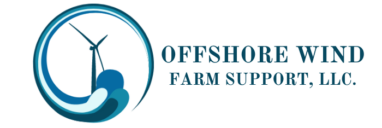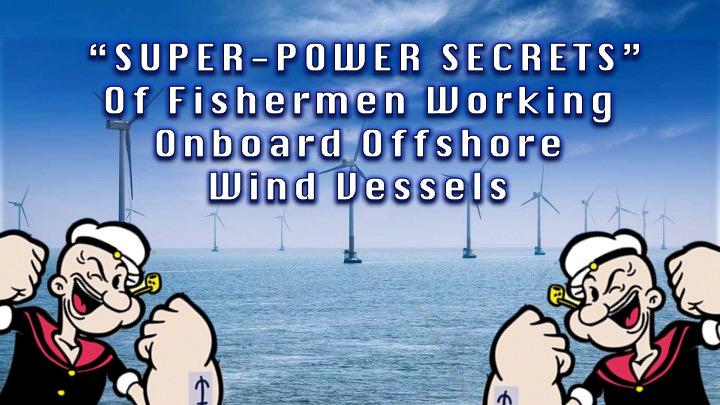They Laughed When We Suggested Fishermen Should Be Working On All Offshore Wind Vessels
… And Now, After Two Years of Incredible Results, The Proof Is In The Pudding.
In this post, I’m going to compare the difference between a fisherman working onboard an Offshore Wind vessel as a Certified Fisheries Liaison Officer (CFLO), and what happens without a fisherman working onboard an Offshore Wind vessel.
There is a stark contrast between outcomes, and by the end of this article, I believe you will clearly understand why it’s so important for Offshore Wind developers to have fishermen working on ALL vessels working in Offshore Wind.
Everything in this article is from my personal experience, or that of my team of CFLO’s currently working onboard Survey Vessels.
#1: As a captain of a survey vessel back in 2019, we were heading into port for supplies and a message comes over VHF channel 16. It was in a deep foreign accent that was barely audible:
NOTICE TO ALL VESSELS SOUTH OF MARTHA’S VINEYARD: this is red survey vessel located at Blank Blank North, and Blank Blank West. All vessels must give red survey vessel a 3 kilometer safety zone. I repeat: This is red survey vessel located at Blank Blank North, and Blank Blank West. Red survey vessel must give red survey vessels a 3 kilometer safety zone.
I ask you to put yourself in a fisherman’s shoes and imagine for a moment that you have been been fishing in the area most of your life, and you hear a demand on the radio like that.
- What thoughts would run through your head?
- How do you think you would feel hearing someone bellowing out orders in your fishing area, in a deep foreign accent using the metric system while In America, we speak in miles, fathoms and yards.
When a foreign voice on a foreign flagged vessel comes on the radio bellowing out commands and measurements no one is familiar with and can’t understand, you can be certain that everyone anyone within radio range is going to get their hair tied up in knots and Voila – a serious and negative perception of Offshore Wind suddenly emerges.
#2: A boat comes up from the Gulf of Mexico. The captain (Master) of the vessel has no idea of the fishing business, knows nothing of local communication, and actually hails other boats the exact opposite way as local custom, so he instantly brands himself as “You’re not from around here.”
The captain thinks to himself, I don’t know what these guys are doing and there is no way I’m going to get on the radio and get yelled at, so I’m just gonna keep my mouth shut and hope for the best. I’ll just call the party chief up to the wheelhouse and have him talk to the guys on the radio.
When something comes up, the party chief is summoned to the wheelhouse.
The part chief has no idea about local practices and feels the survey company has the right of way regardless of the situation and a message is sent for the fishing vessel to get out of the way, giving the survey vessel a couple of kilometer clearance. Note: 95% of the folks collecting survey data use metric which tends to drive the boat guys a little crazy.
Guess what ….. the fisherman has been fishing in the area for most of his life, and the conversation typically ends with the fisherman thinking or saying “you can stick it where the sun don’t shine buddy.”
What’s worse, is now the fisherman gets on the local fishing channel and SHREDS the survey vessel with his friends. You can imagine what happens afterwards.
NOTE: Negative News Travels 100x faster than good news in the fishing business. (I’ll explain why in the next paragraph.)
Let’s Contrast This With What Actually Happens With a CFLO Onboard:
It doesn’t matter what boat or where it’s from. A CFLO comes from the fishing business, understands and speaks the local lingo, and there is a very good chance he actually knows the captain on the fishing boat.
- East Coast fishermen travel from Norfolk, VA all the way up to Portland Maine.
- They typically know one and other.
- They speak the same language.
- Many are related or friends.
- They unload seafood and get supplies up and down the coast.
- They attend weddings and christenings together.
- They are God-parents to each other children.
- The fishing business is community.
- They have dinner together!
A typical conversation between fishermen would go something like this.
CFLO: Calling Viking IV you standing by channel 16?
Viking IV back, switch to channel 19 (depending on the area, they will switch to the local working challenge all fishermen are on).
They switch over and the conversation continues:
CFLO: I see you 4 miles to the west heading our way. You working or steaming?
Viking IV: We’re steaming to the east heading to great south channel.
CFLO: I got ya – we’re just to the east, working to the west. Would you mind giving us a few spokes to starboard and open up the distance a bit? (Spokes means degrees on the compass).
Viking IV: Yea, sure.
CFLO: Thanks we appreciate it.
Viking IV: No problem, have a good day, Viking IV standing by.
Here is another one: with the fishing vessel being a fixed gear lobster or gill netter.
Fisheries Liaison calls FV Melissa Beth:
CFLO: Calling Melissa Beth, you standing by channel 16?
Melissa Beth back, switch to channel 19 (depending on the area, they will switch to the local working challenge all fishermen are on).
CFLO already knows the Melissa Beth is a Lobster Boat
CFLO: We’re towing some gear a few miles south of you and wondering how far down you come.
Melissa Beth: we have gear north of the 60 line from where I am now to the west.
CFLO: Thanks Capt, we will be working from here to the south so we should be all clear. Good fishing to ya – switching back to channel 16.
ONE MORE:
CFLO: Calling to boat on the Bart Simpson (well known fishing spot that on the chart looks like the character Bart Simpson) you standing by channel 16?
Little One: Yeah, this is the Little One. What can I do for you?
CFLO: We’re working to the north and east of you north towing some gear back and forth and I was wondering which way your gear goes. We don’t wanna’ get into it.
Little One replies: We have gear spread out south of the 30 line and west of the 80.
CFLO: I got you fine cap. We’ll stay north of the 30 and west of the 80.
Little One: Thanks a lot. Appreciate it.
CFLO: We’re planning on working down in your area in about a month or so. Would you mind giving me your cell # so I can call you ahead of time?
Little One: Not at all – we should be moving to the SW in about a month. Have a pencil? Take my number. Who are you again?
CFLO: I’m the Fisheries Rep on the survey boat just to the north of you. My name is John. We’re doing some work and we just don’t want to get into any gear.
Little One: Hey, I really appreciate the call. Thanks a lot. I’ll give you a holler when we begin moving out of here.
CFLO: No problem Capt. Good fishing to ya.
End of conversation.
When talking about north of the 30 line and west of the 80, it might sound like a foreign language to anyone not in the fishing business, but a fisherman knows and understands EXACTLY what it means. (Are you beginning to see the difference in communication?)
And Therein Lies The SECRET POWER of CFLO On An Offshore Wind Vessel.
I could go on and on with samples like this because we’ve been been placing, training and certifying fishermen to work on Offshore Wind vessels since January of 2000. Our team of CFLO’s have covered hundreds of thousands of survey miles and completed multiple hundreds of sub sea bottom samples without a single contentious interaction or confrontation with a fishing vessel. ZERO.
Now let’s briefly review what happens if there is a negative interaction between an Offshore Wind boat and a Fisherman when a CFLO isn’t onboard.
Captains of both boats begin yelling at each other on the radio. The captain on the fishing boat grabs a second radio and tells everyone within range to listen in, and immediately there are 4 to 20 boats listening and all of them are getting angry.
When the $hit hits the fan, the Shoreside Fisheries Liaison is notified but it’s already too late. The damage is done and getting worse. The Shoreside Liaison gets dragged into the middle of a $hit-Storm and is forced to try and put out a fire that should never have been started in the first place.
Tempers flair, emotions get triggered, and you can just imagine the damage being done to the public perception of Offshore Wind Industry. There is also gear damage and legal bills to be paid and once lawyers get involved, it erodes the good will the Shoreside Liaisons have developed.
I hope the brief illustrations and explanation gives you a good idea how it is much more advantageous for Offshore Wind Developers to engage CFLO‘s onboard all vessels working in Offshore Wind. Put fishermen on the boats and let the Shoreside Liaisons provide support and do what they do best, which is developing relations with the fishing community around the waterfront.
Certified Fisheries Liaison Officers (CFLO’s) aboard all vessels working in Offshore Wind are vitally important because they virtually eliminate any confrontations, and if there is one, the fire is put out well before it has chance to turn into a public relations nightmare.
Negative interactions can be very costly for everyone in the industry and the developers who choose to not have a CFLO onboard every vessel working in Offshore Wind is, in my opinion, ludicrous because, one negative interaction hurts the entire industry.
In closing, let me give you my “Shameless-Self-Promotion”
Since 2000, Offshore Wind Farm Support has been placing, training and certifying fishermen to work on Offshore Wind vessels and to date, we have covered hundreds of thousands of survey miles, and completed multiple hundreds of deep sub sea bottom samples without a single contentious interaction or confrontation with a fishing vessel. ZERO.
Contact Us for any of your “Boots-On-The-Ground” personnel or service needs.

